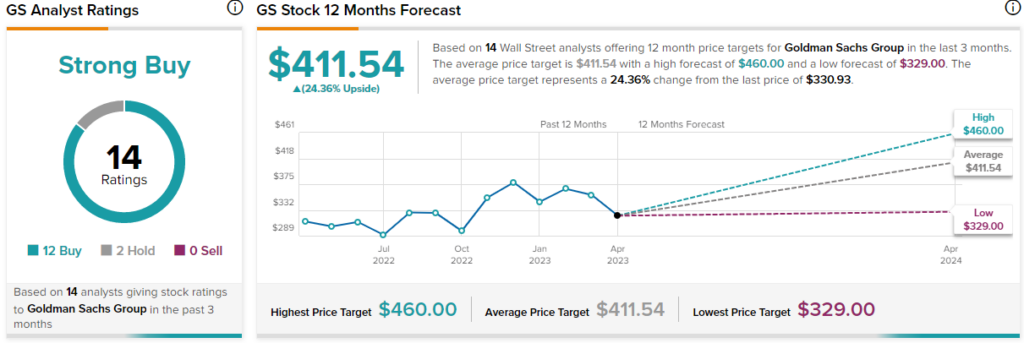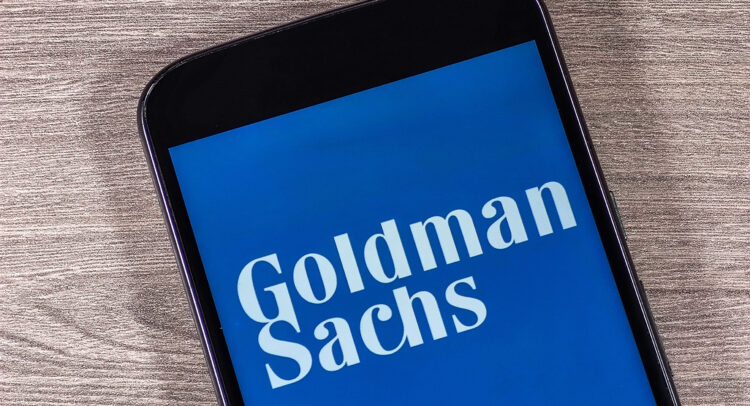The banking industry is clearly in the midst of one of its toughest periods. Tightening regulations with high inflation and interest rates are making investors uncertain of the future. Investment banking behemoth Goldman Sachs (NYSE:GS) stock is down 3.5% year-to-date but has shown slight signs of recovery over the past month (+5%). While its valuation looks attractive, I will continue to stay on the sidelines and wait for signs of stability before I consider investing in Goldman Sachs.
What Lies Ahead
Investors are awaiting the upcoming Q1 earnings scheduled to be released next week on April 18 to get more insights into the future course of deposits as well as the liquidity position at the bank. Wall Street expects Goldman to report an EPS figure of $8.24 versus the $10.76 reported in the corresponding prior-year quarter.
While the bank massively fell short of earnings expectations in Q4 2022, investors are likely to keep a close eye on the upcoming results, particularly the outlook for net interest margins, loan growth, and loan loss provisions, in light of the tightening banking regulations.
At its second-ever Investor Day held on February 28, Goldman reiterated that it is in the process of revamping its business model, shifting its focus back to its core businesses. The company seeks to evaluate strategic alternatives for its Retail & Consumer Banking business, which has reported $3 billion in accumulated losses since 2020.
This could mean that a spinoff or even a complete divestiture could be incumbent. However, no further details were shared on the possible course in the future. That left added uncertainty in the minds of investors.
While the bank continues to see huge potential in its Asset & Wealth Management division, Wall Street would like to see consistent numbers in the coming quarters.
The Banking Industry Debacle
The recent debacle of the banking industry is new to none. Could the dreadful days of the subprime crisis of 2008-09 return? This is the question that has been bothering investors for the past couple of weeks after the collapse of three banks in the U.S. and the Swiss banking giant UBS’ (NYSE:UBS) takeover of struggling rival Credit Suisse (NYSE:CS) for over $3 billion.
While the big banks may not succumb to the ongoing crisis, smaller banks may crumble due to more stringent regulations and the need for higher capital. The industry-wide crisis may lead to higher M&A activities in the future, and big banks like GS may get many opportunities to take over smaller regional banks.
However, tighter regulations also mean lower returns from these banks in the coming quarters. For instance, GS reported a return on tangible equity (ROTE) of 4.8% during Q4 2022 compared to 16.4% in the prior-year period. For Fiscal 2022, the company’s ROTE came in at 11% compared to the 24.3% reported in 2021. That number could go lower if the banking crisis worsens over the coming months.
However, at its Investor Day, Goldman Sachs’ management reiterated its “through-the-cycle” return on tangible equity targets of 15% to 17%. Return on equity is the measure of the financial performance of a company. This indicator has been on the decline for GS, especially in recent quarters.
Positively, however, the company has notably grown its dividends. In fact, its dividends have doubled over the past two years despite an uncertain economic environment. The bank’s payout ratio of 31.6% is also sustainable.
To further entice shareholders, GS announced a massive $30 billion buyback program in February. Still, while Goldman’s dividend yield of around 3% (versus the industry average of 2.1%) and buybacks could help the stock, it may not be enough to compensate for lower returns on equity.
Is GS Stock a Buy, According to Analysts?
As per TipRanks, analysts are optimistic about Goldman Sachs stock, giving it a Strong Buy consensus rating based on 12 Buys and two Holds. Further, GS stock’s average price forecast of $411.54 implies 24.4% upside potential.

Also, in terms of its valuation, GS stock looks relatively cheap with a price-to-book ratio of around 1.1x compared to a bank like Morgan Stanley (NYSE:MS), which is trading at much higher levels of 1.6x.
Conclusion: I’ll Remain on the Sidelines
I last wrote on the Goldman stock after its Q4 earnings. My view on the stock remains the same as I think the struggles of the banking industry will continue in the near term. Plus, GS is making changes, trying to bring down mounting costs and losses in its Retail & Consumer Banking business.
It’s important to note that a stalwart bank like GS has sustained various downturns in the distant past, and its upcoming earnings will give a clearer picture of whether to buy the stock or wait a few more quarters until stability arrives.
Despite its attractive valuation, I will continue to be on the sidelines and wait for signs of revival across the banking industry and GS’ roadmap, in particular, before buying the stock.
















